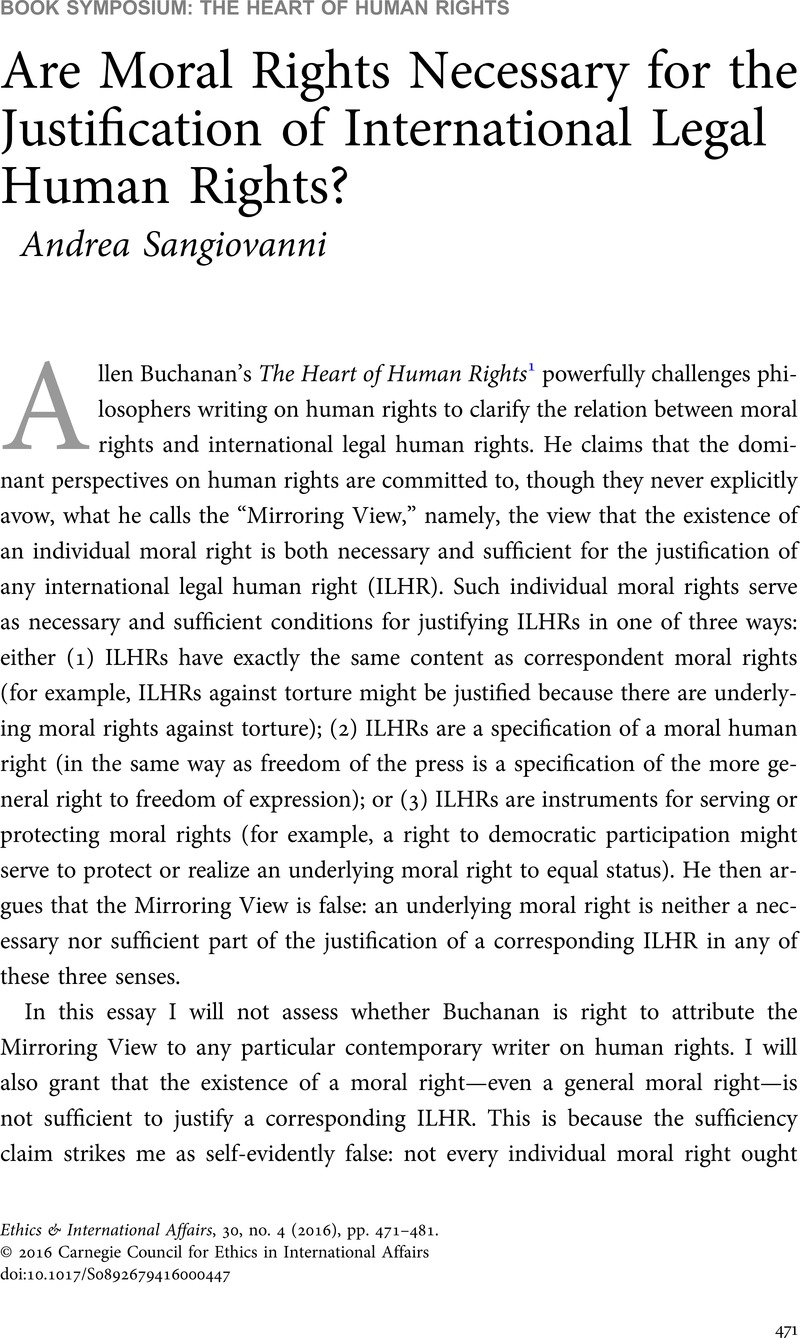Article contents
Are Moral Rights Necessary for the Justification of International Legal Human Rights?
Published online by Cambridge University Press: 08 December 2016
Abstract

- Type
- Book Symposium: The Heart of Human Rights
- Information
- Copyright
- Copyright © Carnegie Council for Ethics in International Affairs 2016
References
NOTES
1 Buchanan, Allen, The Heart of Human Rights (New York: Oxford University Press, 2013)CrossRefGoogle Scholar.
2 When pressed, one might try then to tighten the conditions on what kinds of moral rights count as sufficient for justifying a corresponding ILHR. One might say, for example, that only those moral rights that are of international concern or in some way basic or that would merit international intervention ought to be legalized. But even here it strikes me that Buchanan is right that any of these fixes would still not make the constrained moral rights sufficient. Until we know how the moral right would be legalized and what further consequences such legalization would have, we cannot be sure that the creation of a corresponding ILHR would be all-things-considered justified. At most, we could say that the constrained moral rights give us pro tanto reasons to seek their legalization, but, absent further argument, we would not therefore be able to say whether we ought or ought not to implement the ILHR in question.
3 Buchanan, The Heart of Human Rights, p. 53.
4 Hohfeld, W. N., Fundamental Legal Conceptions, As Applied in Judicial Reasoning (New Haven: Yale University Press, 1964)Google Scholar.
5 See, for example, Raz, Joseph, “Rights and Individual Well-Being,” Ratio Juris 5, no. 2 (1992), pp. 127–42CrossRefGoogle Scholar; and Kramer, M. H., “Rights without Trimmings,” in Kramer, M. H. et al. , ed., A Debate Over Rights (New York: Oxford University Press, 1998), pp. 60–100 Google Scholar.
6 See, for example, Sreenivasan, Gopal, “Duties and Their Direction,” Ethics 120, no. 3 (2010), pp. 465–94CrossRefGoogle Scholar; and Wenar, Leif, “The Nature of Claim-Rights,” Ethics 123, no. 2 (2013), pp. 202–29CrossRefGoogle Scholar.
7 For this example I draw on Sangiovanni, Andrea, Humanity without Dignity: Moral Equality, Respect, and Human Rights (Cambridge, Mass.: Harvard University Press, forthcoming, 2017)Google Scholar.
8 See Human Rights Watch, “Protecting Child and Adult Gold Miners Against Mercury: A Right to Health Issue,” October 17, 2011, www.hrw.org/news/2011/10/17/protecting-child-and-adult-gold-miners-against-mercury-right-health-issue.
9 Of course, one might just decide to call them legal human rights by, for example, embedding them in a treaty, but it is uncontroversial to claim that this would be to radically misunderstand the nature of the international legal human rights system for precisely the reason that Buchanan gives, and which I quote in the text.
10 Buchanan, The Heart of Human Rights, p. 27, emphasis in the original.
11 Ibid.
12 I am adopting a largely interest-based theory of rights for the purposes of illustration (as does Buchanan), but the argument would hold if we substituted “status” for “interests,” so I leave the distinction aside in what follows.
13 See Buchanan, The Heart of Human Rights, p. 58ff; and Sreenivasan, Gopal, “A Human Right to Health? Some Inconclusive Scepticism,” Aristotelian Society Supplementary Volume 86, no. 1 (2012), pp. 239–65CrossRefGoogle Scholar.
14 Buchanan, The Heart of Human Rights, pp. 63–64.
15 This summary is based on materials reproduced in Steiner, Henry, Alston, Philip and Goodman, Ryan, International Human Rights in Context (New York: Oxford University Press, 2008)Google Scholar, p. 936ff.
16 I say much more about this specification of moral rights—i.e., moral human rights—as well as how it compares to both Orthodox and Political accounts of such rights in ch. 4 of Sangiovanni, Humanity without Dignity: Moral Equality, Respect, and Human Rights.
- 1
- Cited by




